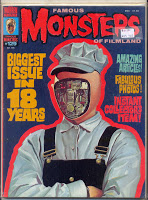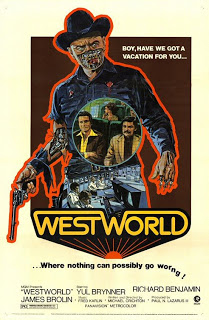Michael Crichton never met a technology he ever liked.
His books and films are filled with alarmist bashing of the potential of robotics (Westworld), cloning (Jurassic Park), brain implants (The Terminal Man), time travel (Timeline), genetic splicing (Next), and biological warfare (The Andromeda Strain). Okay, maybe I’ll give him that last one, but as a Transhumanist myself I’ve got to say that he’s not been the most technophilic of writers.
That being said, he makes a pretty good movie most of the time, and Westworld is one of them. This one is still shown on late-night television, and it’s well worth the watching. With the obvious exception of Jurassic Park, this is probably the best Crichton film out there (although I’m a big fan of 1981’s “Looker” as well).
The film revolves around the futuristic resort of Delos, where robotic fantasies come to life in one of three immersive environments; Medieval World, Roman World, and Western World. Each is a marvel of technology and ingenuity, as the environment is rendered down to the smallest detail, and populated with completely lifelike robots. These are the protagonists in the game, being the foes in sword fights in Medieval World, gun fights in Western World, and so forth, that the guests (paying a then-princely $1,000 a day) can overcome and thus draw the fullest experience from the whole. You can shoot the robots, run them through with swords, and it’s all safe and foolproof. The guns, for instance, won’t fire at anything with a high body temperature such as a person (although they never do seem to explain how the swords in Medieval and Roman World have similar safeguards).
Enter Peter and John (played by Richard Benjamin of “Quark” fame and James Brolin, respectively), two friends who come to the resort purely as a vacation, John being a repeat customer showing Peter the ropes. They have chosen Western World as their destination, although the film does go into some of the experiences of one of the guests of Medieval World, while the Roman World is left relatively unexplored. (Which is a pity, as of the three, I would personally have chosen Medieval World, and then Roman World, and only lastly Western World.)
The two explore the western town, authentic in every detail, and Peter ends up gunning down a Gunslinger (played by Yul Brynner in a role that was soon to become iconic). They share in the debaucheries of the place, kill the same Gunslinger again, Peter gets arrested and John ends up busting him out of the jail, and everything seems perfect. It’s like playing a live action version of Boot Hill without the duct tape of a regular LARP.
However, we are also treated to what goes on behind the scenes at Delos. The robots are serviced every night in an underground control facility, and we are told that some sort of epidemic of “central malfunctions” has been plaguing the entire resort, cause unknown. You can see what’s coming next.
The next time the pair meet up with the Gunslinger, things don’t go quite according to the game. John is shot down in the street, and the Gunslinger ends up going after Peter. The entire resort goes haywire (for no reason that’s really adequately given, other than Crichton’s standard message that “the technology is too complex and anything that complex must, eventually, go berserk and kill innocent people by virtue of its complexity and the fact that it makes me uncomfortable”). The guest we’ve been following in Medieval World gets a sword thrust through him by the Black Knight. The music changes, and the entire tone of the film takes a 90 degree turn. (It’s honestly a very effective setup; the delineation between “Delos is fine” and “Delos is a deathtrap” is jarring, as it should be, marked very effectively by discordant piano music, and things that were passed off as minor are suddenly revealed to be Very Bad Things.)
Peter, pursued by the Gunslinger, tries to escape Western World, where he meets a technician who lets him know that the entire resort has broken down and gives him some fleeting bits of advice on how to foil the Gunslinger before the technician is, himself, gunned down. Peter flees through Roman World and eventually makes his way to the underground control center where he finds all of the technicians dead– asphyxiated in the control room, as the door was locked shut when they tried to cut the power to the resort to stop the rampaging robots, who are going on battery power.
 Via the underground, he makes his way to Medieval World, finds a young damsel in distress who turns out to be a robot, and finally puts the Gunslinger to rest, but not after a couple of nice “oh, he’s not quite dead yet” moments that seem to be the basis for the much later films Halloween and The Terminator. Peter survives, but he’s one of the few lucky ones who do.
Via the underground, he makes his way to Medieval World, finds a young damsel in distress who turns out to be a robot, and finally puts the Gunslinger to rest, but not after a couple of nice “oh, he’s not quite dead yet” moments that seem to be the basis for the much later films Halloween and The Terminator. Peter survives, but he’s one of the few lucky ones who do.
I don’t pretend that this film has any of the social commentary (other than the blatant anti-technological commentary already noted) of some of the other films in this series, but I’ve got to say this is one of the most flat-out *fun* ones. To this day I would love to go to a (properly) functioning Delos-type resort, and I think eventually we will see this type of resort actually up and running. Compare to the Lary Niven novel “Dream Park”, where the same sort of effect was achieved with a combination of robotics, holograms, and other technology. It’s also the first film where I actually *noticed* the music; the change over to the piano/violin chords as the Gunslinger pursues Peter into Roman World was the first thing that made me aware of just how important the music was to a film.
There was a pretty bad sequel, Futureworld, which had the Delos folks trying to take over the world by replacing world leaders with robots, but it had none of the charm of the original. Apparently, there was also a short-lived television series “Beyond Westworld”, but I know nothing of it beyond its mention on Wikipedia, and I cannot help but suspect it was pretty damn dreadful.










I had no idea that he did Looker. What a great movie. Albert Finney if I recall. Andromeda Strain is still up there for me too.
Westworld is an incredible classic.
Crichton's work follows the very 1950's extension of Frankenstein… what we create will go out of control (which could also be extensions of the Golem mythology)
There also seem to be commentary about systems and controls, but I'm not sure what solutions are ever offered, or can be offered.
Even though not regarded as a great movie, I thought Timeline was good as well.
I do believe that Yul Brynner's Gunslinger might've been the scariest 'monster' I saw as a kid that wasn't in any makeup or a rubber suit. I haven't read any correlation between the Gunslinger's 'silent stalking' and how it was echoed in Carpenter's Halloween.
I never really took his work to be alarmist. He also was responsible for 13th Warrior.
Just realized; "Looker" is anti-plastic surgery, as well. 🙂
> Richard Benjamin of "Quark" fame
You know… that's the way I think of Benjamin too in spite of "Goodbye, Columbus" and "Portnoy's Complaint."
Of course, Brynner's role was just a callback to his black-hatted stranger in The Magnificent Seven.
You gotta love how those 70's trailers just have got to spoil and reveal all the key scenes in the movie.
“(for no reason that’s really adequately given, other than Crichton’s standard message that ‘the technology is too complex and anything that complex must, eventually, go berserk and kill innocent people by virtue of its complexity and the fact that it makes me uncomfortable’)”
Reading this, it struck me as ironic that, in my line of work, it is often the case that failures do seem entirely random and unexpected. It’s only after lots of careful debugging that it all finally makes sense.